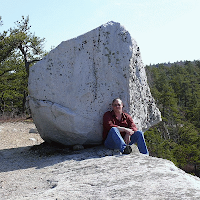First off, everyone knows (or should know) that Christopher Columbus (1451-1506) did not "discover" America - there were indigenous people already living here for thousands of years!
Nor was he likely the first European to visit the area (he never even set foot on the North American mainland) - the Norse had a settlement at L'Anse aux Meadows in Newfoundland around1000 AD.
To be fair, however, Columbus began the era of sustained contact between the Old and New Worlds. We even use the term Pre-Columbian to describe the New World prior to his arrival.
The problem with Columbus, and the reason why I don't feel he's deserving of a holiday, is the fact that he was not a nice guy - even by the far looser standards of his day. To his credit, he was a self-educated and intelligent man - he was widely read and spoke several languages. He was also ambitious and brave - there's no way one can do what he did without cojones.
It's also hard to blame Columbus for the diseases brought to the Americas by European contact. It was mostly unintentional and Columbus and his men certainly weren't the only Europeans responsible for the epidemics of smallpox and other diseases that ravaged the Native Americans.
We can however, take him to task for his treatment of the Taino. After his first contact with them, Columbus wrote in his log:
"They... brought us parrots and balls of cotton and spears and many other things, which they exchanged for the glass beads and hawks' bells. They willingly traded everything they owned.... They were well-built, with good bodies and handsome features.... They do not bear arms, and do not know them, for I showed them a sword, they took it by the edge and cut themselves out of ignorance. They have no iron. Their spears are made of cane.... They would make fine servants.... With fifty men we could subjugate them all and make them do whatever we want."
As Howard Zinn wrote, in A People's History of the United States:
In the province of Cicao on Haiti, where he and his men imagined huge gold fields to exist, they ordered all persons fourteen years or older to collect a certain quantity of gold every three months. When they brought it, they were given copper tokens to hang around their necks. Indians found without a copper token had their hands cut off and bled to death. The Indians had been given an impossible task. The only gold around was bits of dust garnered from the streams. So they fled, were hunted down with dogs, and were killed.Due to disease and the unspeakable cruelties - torture, rape, slavery, and murder - visited upon the Taino, an estimated 90% of them died in a generation. Columbus engaged in genocide of the indigenous peoples of the Caribbean. A contemporary of Columbus, Consuelo Varela, a Spanish historian, wrote: "Even those who loved him had to admit the atrocities that had taken place." At one point, he was hauled back to Spain in chains because of his brutality as Governor of Hispaniola (and the Spaniards of the time weren't bleeding heart liberals - think of the Inquisition and Conquistadors!).
In addition to the decimation of the indigenous peoples of the Caribbean, Columbus's other enduring legacy was the initiation of the transatlantic slave trade.
Why we have a holiday honoring this man, I have no idea. Some localities have replaced Columbus Day with Indigenous People's Day or Native American Day. That I could support.




We often choose to ignore our history, this is true in most cultures. I'm English and our heritage is Germanic (Anglo-Saxon) but most people in the UK do not appriciate this simple fact. Even the invading French in 1066 (Battle of Hastings) were Normans derived from the term Norse Men meaning coming from the North hence Germanic too.
ReplyDeleteThat is so true we are learning this in Texas History and it is tragic that a lot of people that don't know about this because we choose to forget the atrocities.
Delete